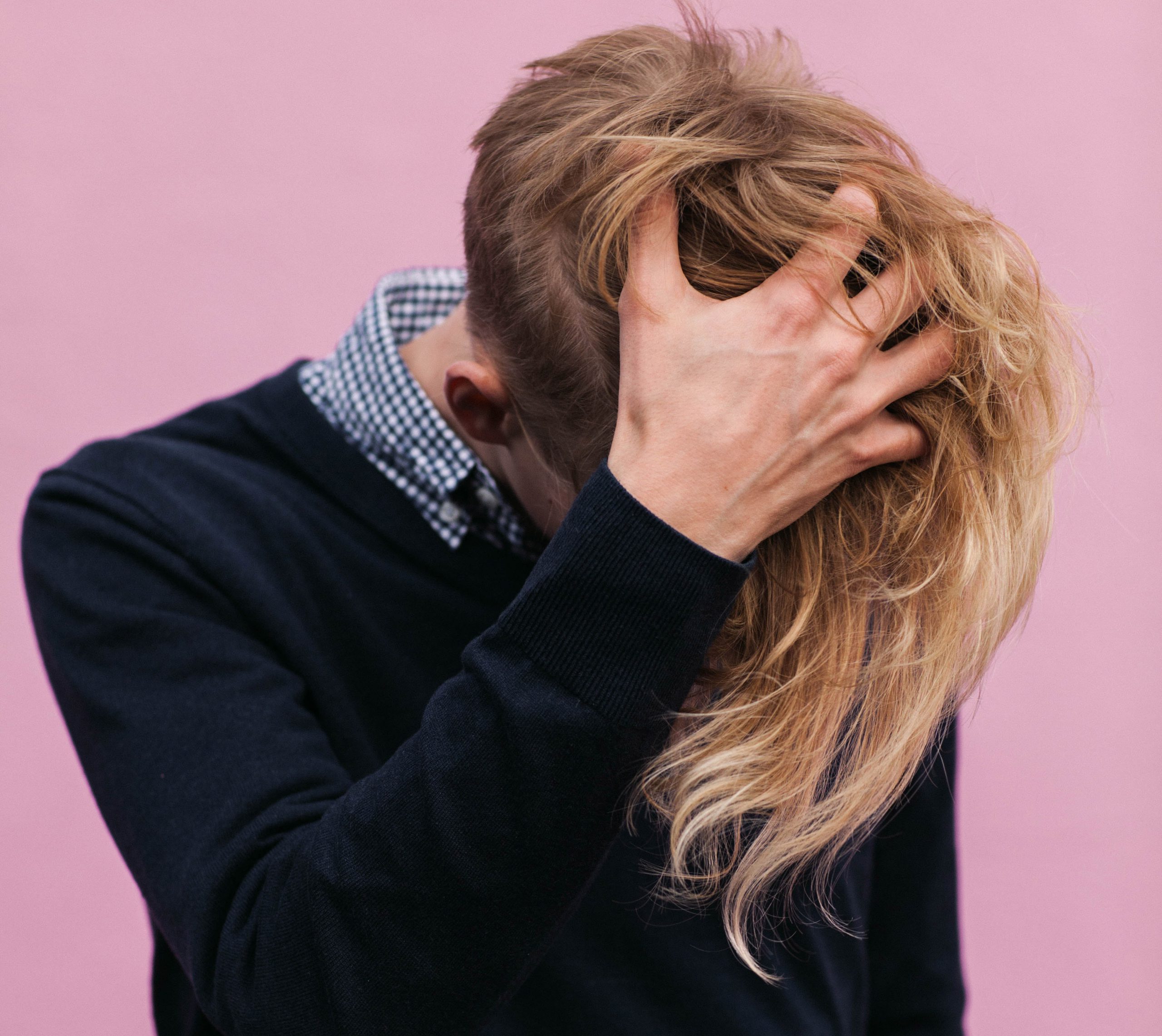Written by Claire Livingston.
Art by Karina Carvalho.
In my first gender studies class, my professor said the words, “gender is a performance” and that changed everything for me. I already thought of gender as a spectrum, but I had never thought of it as something each person chooses to present to the world, whether they are cis or not. Up until then, and even for a few years after, I identified as a cis woman. I had been sure of my label as a bisexual person since my early teens, but I didn’t question my gender until college.
Then I started having gender dysphoria, particularly when I looked at very muscular men or athletes. I considered that I might be nonbinary. I’ve always been on the more masculine side of both gender presentation and behavior. I have many traits that have been labeled as masculine, both physically and in my personality. I’m 5’10 and I have naturally broad shoulders and narrow hips. I’m confident, persistent, and loud with a dry sense of humor. Even ex boyfriends have told me I act ‘like a guy’. But none of that pushed me to identify as nonbinary – what did was being in a Discord server for Tiktok creators. Everyone in the server was queer and most of us were afab. Some people were transmasc, but by far the most common demographic was bisexual afab nonbinary people that use she/they pronouns. At the time, I simply identified as a bisexual woman with she/her pronouns.
Here’s where it’s important to mention that I am bisexual with a preference for men. This is fairly common. Many bisexual people have a gender preference and it doesn’t make us any less bisexual. However, in my experience in the queer community, I have found that bisexual women are expected to downplay our attraction to men in order to be “queer enough” to take up space in the community. You’ll see a lot of women making jokes that they’re attracted to every woman they see and four men total. Or you’ll see someone say “unfortunately I’m also attracted to men.”
I have found that bisexual women are expected to downplay our attraction to men in order to be “queer enough” to take up space in the community.
Talk like this rubbed me the wrong way because I’m not at all ashamed of my attraction to men. I’m attracted to men in probably the queerest way possible. So when people in this Discord server started with this sort of talk, I felt ostracized. I wasn’t queer enough to fit into this fundamentally queer group.
I figured if so many nonbinary people I knew I met presented as mostly feminine, then it made sense for me to use she/they pronouns and present mostly feminine as well. The difference between me and the other people using she/they pronouns was that they were upset when they were misgendered. I couldn’t relate. Being in touch with femininity as well as masculinity felt essential to me.
I don’t need to force myself to be more queer to fit in.
I used she/they pronouns for nearly a year. I immediately felt more queer. It didn’t matter if people in the community thought my bisexual identity was invalid, I would always be queer because I was nonbinary. And because gender is a performance, I knew that I did not have to dress or present a certain way to “prove” that I was nonbinary, the way I always felt I had to “prove” I was bisexual by dating women.
All of my friends were very supportive and used my new pronouns. My brother began referring to me as his “sibling” instead of his “sister.” I didn’t change anything about my dress or appearance. I’ve always shopped in both men’s and women’s sections of stores. Basically nothing changed except those pronouns.
It didn’t matter if people in the community thought my bisexual identity was invalid, I would always be queer because I was nonbinary.
I’ve always been jealous of how easily amab people can build muscle. I’ve always wanted to build muscle like that, but with my mental health, I couldn’t seem to do it. Now, my meds are balanced, I have energy, and I moved into an apartment building with a gym. I’ve been working out and I see definition in my shoulders and biceps, and growth in my quads and glutes. Contrary to what I believed, this hasn’t fixed my body dysmorphia by making me feel more in touch with my masculinity. It’s made me feel more comfortably feminine than I have felt in my entire life.
Now that more COVID restrictions are being lifted, I’m hanging out with my friends in groups, which means I’ve had more opportunities to hear people refer to me as “they.” The issue is, every time I hear it, I cringe. I feel like I’m faking or they’re talking about someone else. I know that isn’t how nonbinary people feel. And I’ve started to realize how much internalized biphobia I’ve been holding onto.
I’ve started to realize how much internalized biphobia I’ve been holding onto.
It’s been a few more weeks now, and I’ve asked my friends to use she/her pronouns exclusively for me again. I’m a woman with masculine features– that doesn’t mean I can’t identify as a woman. I’m bisexual with a preference for men– that doesn’t mean I’m not a part of the queer community. I don’t need to force myself to be more queer to fit in. My internalized biphobia was only hurting me in the long run.
About the Author
Claire Livingston is a writer from Texas with an interest in sports and gender studies. Her weekends are spent hiking, skiing, or watching hockey. She lives with her golden retriever Hank and is about to graduate from college.
Follow on IG: @claireelivingston | Follow on Twitter: @

